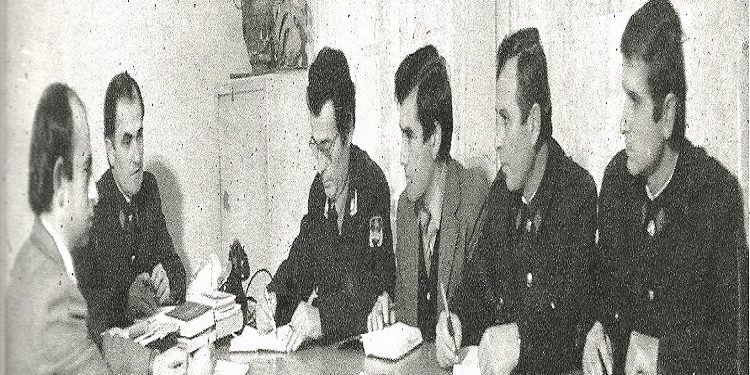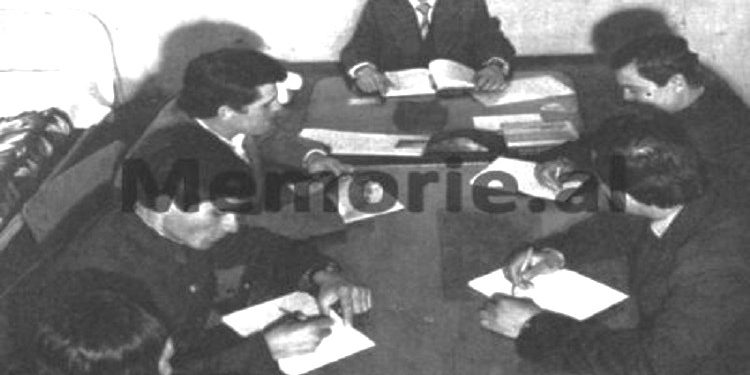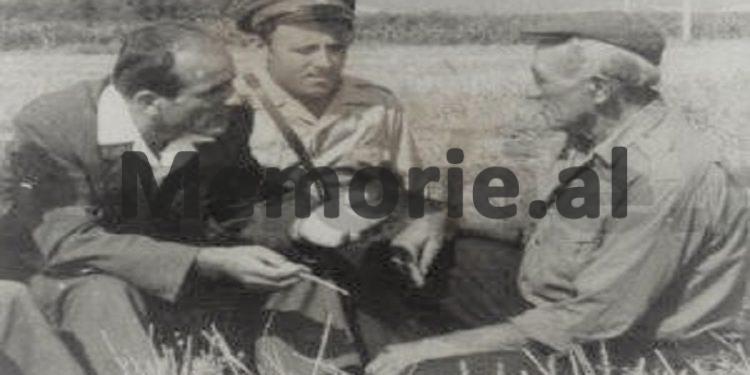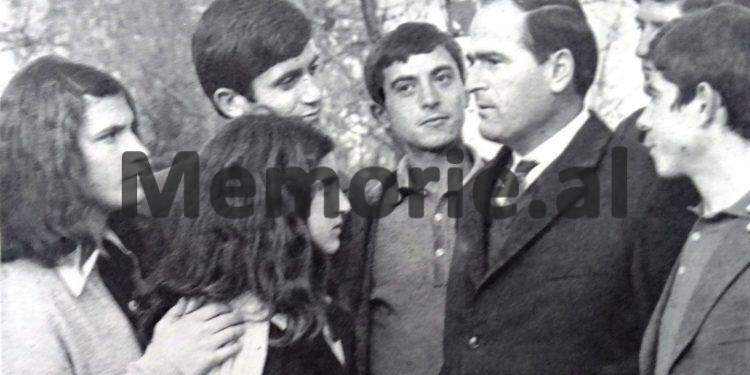From Professor Dr. Aleksandër Meksi
Part Two
Memorie.al / In the last 25-30 years of Albanian history, there are many past events, activities, and crimes which, because they remain unclarified, appear from time to time before the public. In terms of interest in them, the public is divided into two groups, besides the indifferent and those who are busy with bigger “work”: those who seek the truth, whatever it may be-only the truths and the whole truth-and those who do not want this, who seek to sink the process or seek to illuminate only aspects favorable to them (or at least not unfavorable). For me personally, the boundary between those who seek these truths and those who do not want or prevent such a thing is the line of demarcation between democrats and nostalgics for yesterday, for the shameful communist past. The unification of their proposals would mean that there is no such line today.
Continued from the previous issue
Surveillance and verification were regularly carried out on individuals who were approved for preliminary processing. It did not last more than five days without interruption and was performed by the illegal operative workers of the State Security, according to special rules for this work. Through verification, materials were collected on the biography, political stance of the person, their relatives, and other people connected to them. Information was obtained from legal and illegal operative workers, as well as secret collaborators recruited on a voluntary basis or party members.
The platforms also deal with other aspects of the work of the Ministry of Internal Affairs (MPB), such as: prisons and camps, state encryption, prosecutor-court relations, conspiracy, which, of course, is of interest to know the work of the Ministry of Internal Affairs. A special place in the platforms is the Special College of the Ministry of Internal Affairs, which was formed by a decision of the Presidium of the People’s Assembly and judged all crimes against the state committed by operative workers or secret collaborators of the State Security, police, and army intelligence, only when these crimes against the state were related to their agent and operative work.
The study of the platforms that have emerged and been approved in different years, which do not reject the working method but specify it according to the time they are approved, also shows us special elements that shed more complete light on the working method of the State Security. For example: it is stated that informants operate outside enemy groups and only provide data, while the agent operates within them and is used for the processing of enemy elements.
Of interest is also the use of the operative’s personal collaborators, or even of the bosses who are not part of the agent network, but only maintain contact with them. It is worth saying that the recruitments of the agency have continued until March 1991.
The study of the working method of the State Security shows that the organs of the Dictatorship of the Proletariat (read communist violence) formed a pyramid at the top of which was the PPSH (Party of Labour of Albania), the first secretary of the Central Committee, the Political Bureau, the relevant Sector for State Security, and continued with the Ministry of Internal Affairs, the Security branches in the field, the operative workers, and the agent network of collaborators. Besides them, and parallel to them, the communists, front activists, AGBV (Members of Voluntary Cooperation Groups), etc., acted as a “patriotic duty,” denouncing and reporting the unfortunate to the State Security organs for activities that they “judged” were against the state and the Party.
It is worth remembering here the third point of the agenda of the meetings of the various PPSH basic organizations, in which vigilant communists spoke about the actions of the “class enemy.” For these, and many other reasons, in addition to the files, the party archives, the records of denunciations, and even the characteristics of the cadres on the basis of which the assessment of people’s political stance was made, should be seen. What we presented above, based on official documentation and knowledge of concrete facts and activities, shows without any discussion for us that all the components of this structure are equally responsible and harmful in the construction and progress of democratic Albania today, even more so the ideologues and order-givers, than the ultimate implementers.
The isolation, which we read and hear about during these years, even in these last days, from this pyramid only of the agent network, recruited with obligation, because others were called “silent heroes,” shows that the bearers of this thought or opinion are still with the principles of Marxism-Leninism, the need for the Dictatorship of the Proletariat, for the class struggle, and the presence of the class and party enemy.
This was the structure of violence against the enemy of the party and the communist power, which also kept all honest Albanians under pressure in those years. People were wary of anyone who approached them, whispered with some intimate friend when they spoke against the regime, even for some dissatisfaction, applauded and cheered with difficulty at meetings, parades, and rallies, went to actions and voluntary work without opposing.
This was the true face of Albanian communism and the notorious State Security. However, the real victims were first and foremost those who suffered for the actions and circumstances we mentioned above, who were killed with and without trial, who were imprisoned, interned, and deported, “were put to the pickaxe” and forced labor (insulting the work itself), were forced to escape or divorce, were denied schooling, etc., etc.
The current figures speak of 5,557 men and 450 women killed, 26,768 imprisoned, 998 dead in prisons, 308 insane from torture, over 32,000 interned and deported, 7,002 dead in labor camps, over 15,000 who fled, etc. All of them should be respected, helped, and supported to be included in today’s life. For these crimes, forgiveness and repentance should be sought, but Albanian communists have not yet found the time for such a humane act. Maybe it’s better this way, and we don’t have to ask them when they don’t feel it.
All this activity has been with responsibility, even with consequences in cases of errors, failures, the need for justification (the case of Koçi Xoxe), and for the Security employees themselves and the policy drafters, its implementers, and the order-givers.
The Archives
Near the ministry and the Security branches, the archives functioned, in which, with a very detailed and strict regulation of archiving (storage and destruction), all the documentation of the State Security was kept. Since today there is talk and speculation from the lack of knowledge of the problem, or the desire for disinformation and deviation of the unwanted debate, it is useful to express and give some data on this issue. The archive of the former MPB is today scattered in several institutions. I think it would be in the interest of studying and documenting the history of those years to create the State Historical Archive of the former MPB.
The Archive of the State Security (today near SHIK-i and the Ministry of Foreign Affairs) consisted of the Intelligence Fund and the Counter-Intelligence Fund, for which there are corresponding registers. The Intelligence Fund included the Fund of those who fled, the Fund of Kosovo, the economic Fund (pre-liberation economic emigrants), and the Fund of foreigners. Of importance for the issue being discussed today is the Counter-Intelligence Fund, divided according to branches and in the Fourth Directorate (the card index of the MPB). It consisted mainly of:
Registers of the agency, processing, archived files, contingents, advised and unmasked persons, interned and deported, denunciations and reports, information (for non-contingent and in-process persons), postal control (internal and external), technical-operative objects and actions (TO), the special Fund, the repatriated, wanted persons, border violators, as well as registers and documentation of archival work.
Besides them, there were also a number of File categories such as:
Personal work file, processing file, management file (for the economy, for the anti-party element, for foreign intelligence, for foreigners, for those who fled, for legal channels), files of objects of special importance, search files, author discovery files, agent files, the work book of the operatives, as well as other files (for the repatriated, for the convicted, for the interned, for the activity of gangs and foreign intelligence). It is understood that besides them, the archive, like any state archive, has statistical data, files with destruction minutes of documentation and materials of special importance for a special time of war, and other data created during the years of the MPB’s activity.
Just imagine how many Albanians inside and outside the country, living and dead, were in all these funds, registers, and files. As far as I remember, at the beginning of 1992, based on an order from the Ministry of Public Order and the SHIK of the technical government, the archives of the districts, which we mentioned above, were handed over to the Ministry of Public Order and later, during 1993, were handed over to the SHIK archive.
According to a government order, both the files and the registers were inventoried. If my memory does not deceive me, 542 names were erased from the agency registers, for perverse interests (that’s why the number was imprinted on me) in different ways (scratching, scribbling, with white ink). About 30% of them could be read with simple expertise, for the others, more specialized laboratories were needed.
The group that took them over and made the inventory noted that the destruction of the files had not been done in accordance with all the norms in force for state archives and with the special regulation of the MPB archive, which constituted a blatant and intentional violation of them. For this, the order-givers were brought to justice.
With these illegal orders, which I am sure are preserved, a part of the MPB archives was destroyed, certainly in the interest of hiding the crimes of communism, in the interest of protecting their people, in the interest of using some weak people to get them into the anti-communist opposition, as well as those from the ranks of the highly educated who “excelled” with ordered requests and articles for Ramizian pseudo-pluralism, and shrill criticism against the communist leaders, those whom the communists had on the lists of those to be promoted to posts until yesterday, and after December ’90, to lead the opposition against the PPSH.
As far as I remember, during the last decade of the communist regime, about 40 thousand (forty thousand) files were destroyed, the overwhelming majority of which in the last three years. Be that as it may, these figures remain to be checked.
From the moment that certain individuals accuse the opponent of these illegal actions, not only before politicians but also before the wider interested public, the questions arise: What was in these archives (of the PPSH and the MPB) related to the crimes of communism and the State Security? How should this documentation be stored, and for how long? What has been destroyed and what is left? Who did these actions and when? What are the responsibilities and should the law act on this conscious crime against our painful and shameful history?
In the last years of the agony of the Albanian communist regime, the citizens of Tirana always gossiped about the work of the “kneading machines” that worked 24 hours in the basements of the Ministry of Internal Affairs. This was done intensively and openly after mid-1990, when, in addition to hiding the traces we talked about above, the PPSH and the State Security enabled the departure from the country of their people and the compromised, who, as Izet Shehu rightly noted, left like mice and returned after 1997-1998. Only the communists and the Security were interested in these actions, not those who came to power in 1992 with the free vote of the people. They had no reason to hide the crimes of others, on the contrary.
In such circumstances, I think that an investigation or study should be made to determine the problems related to the state of the Archive of the former MPB, and even for the Army Intelligence, to answer all the questions that were raised above and that are not only ours. However, to protect the democratic order, as Fatos Klosi also noted, the registers of the agent network are preserved and what is missing can be further searched in these archives.
Similarly, in the cadre offices or elsewhere, the full lists of State Security officers, leaders, and operatives (legal and illegal), of prisons and camps, those who have finished the security school (about 4,000) and others like them in the structures of violence are preserved, where, we repeat for the umpteenth time, the collaborators are the last step of those who should be held accountable and the majority were recruited by force. Don’t pretend you don’t know, don’t pretend you forget this, you, deputies of all colors, who speak almost the same on this issue.
I also have the conviction that, if everything that is preserved, the practices and rules of the archive of the former PPSH and the former MPB are studied, always with strictly scientific criteria and by capable and predisposed people (not connected with the Security and the PPSH, as well as with their structures responsible for violence or in “conflict of interest”), positive results can be achieved for the knowledge and re-constitution of the archive. Similarly, I am convinced that duplicates are preserved.
To give a quick answer about the degree of preservation of archival documentation, and when and by whom the damages were made, a small working group can be assigned, from those who have had or have the right to have a vision of this archive, from both sides of Albanian politics, which has administered this archive. A short-term answer can avoid debates (from some not without purpose) on this issue.
We want to present a final problem, which is related to the creation of the Historical Archive of the former MPB. After its possible systematization and constitution, there is an urgent need for the declassification of materials related to the policies of the State Security, those of the PPSH, for the Dictatorship of the Proletariat, the class struggle, and everything related to communist violence and terror, as well as the judicial processes, which are today preserved as a special part in the archive of the MPB.
Similarly, access to all these archives should be immediately allowed for materials of cognitive and study value, which are related to the criminal work of the two former institutions, or to be more precise; those that have passed a certain deadline, although, today, after so many years, there should be no deadline for materials that do not deal with problems of relations with other states and that for this reason may still need to be secret, as well as when they do not affect the privacy of special persons. Although, in many of these two cases that we distinguished above, the archives also provide copies, where the parts that are not allowed for everyone are hidden, because only they are secret.
Only in this way will this Archive be open and its materials in the hands of anyone for studies and not just for scientists and salaried analysts. The truth must be the property of everyone. Only then will history and the truth, which speaks of what really happened, are able to be written, and whoever is honest, after that, will try not to repeat the mistakes.
In this writing, we tried to address the problems that are presented in the title, namely: What is, on what platform and how did the State Security work, and what are and in what condition are the archives of the former MPB preserved? For the measures of totalitarian violence, the need to punish it, for the measures that have been taken during the years ’92-’96, and that should be taken even today for the preservation of the democratic order, for the avoidance of the whole pyramid of violence from power, including the “Files” issue, of course by improving them with our experience and that of other Eastern countries, after so many years since the overthrow of the dictatorship, we will talk in the next writing: “The issue is communist violence, or just the Files?” / Memorie.al
















